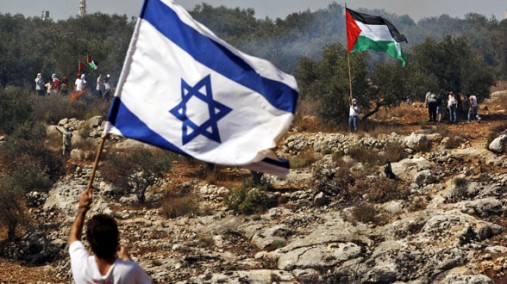IN THE MEDIA
There can’t be peace without compromise between Israel and the Palestinians
January 15, 2014 | Jamie Hyams

Jamie Hyams
HERALD SUN – JANUARY 15, 2014
JOSEPH Wakim’s metaphor of refugees taking over a home (“Australia must find balance on Palestinians,” January 10) is all very nice, but completely irrelevant to the Israeli/Palestinian situation.
It falsely assumes that the Palestinians were there first and the Jews came later and forced them out and that Israel has never offered to share the land nor been subjected to violence.
In fact, for thousands of years, what is now Israel has been the Jewish homeland and has had a substantial Jewish population. It has never been a Palestinian state. When the UN partitioned the area in 1947, the Jews were allocated the areas where they were the majority, with the rest going to the Arab inhabitants.
The Jews accepted this partition, but the local Arabs and surrounding Arab countries instead launched a war intended to wipe the new Jewish state off the map. Israel won that war in 1948, and other defensive wars in 1967 – when it captured the West Bank, Sinai Desert, Gaza and the Golan Heights – and in 1973.
Following the 1967 War, Israel offered to return land for peace, but the Arab League responded with what became known as “the three noes” – no peace with Israel, no recognition of Israel and no negotiations with Israel.
Yet when Egypt did decide to negotiate peace in 1977, Israel completely evacuated all its settlements in the Sinai, returning it to Egyptian sovereignty.
Throughout its existence, Israel has been forced to defend its citizens against terrorism from groups such as the PLO, Hamas, Hezbollah and Islamic Jihad. Rocket attacks, terrorist infiltration, suicide bombings and other violence against Israeli civilians have been almost continuous.
Israeli responses to these attacks have included incursions into Lebanon and Gaza, the security barrier and checkpoints in and around the West Bank and targeting the terrorists responsible – all effective reactions consistent with the right of self-defence as practised by other democracies in similar situations.
Israel has consistently sought peace with the Palestinians. In 1993, it signed the Oslo Accords. At Camp David and Taba in 2000 and 2001, Israel, under PM Ehud Barak, and with President Clinton’s support, offered the Palestinians Gaza, almost all the West Bank, with Israeli land in exchange for the rest, a shared capital in Jerusalem and financial compensation for refugees. Yasser Arafat not only refused, but launched a terrorist intifada which killed or seriously injured thousands of Israelis.
In 2005, Israel under PM Ariel Sharon – who died on Saturday – totally withdrew from Gaza, evacuating 21 settlements and giving the Palestinians complete control, in the hope that they would establish a peaceful society living alongside Israel. It intended this would lead to further withdrawals and ultimately peace. The Palestinian response, however, was thousands of rockets fired at Israeli civilians and the election of the terrorist, rejectionist Hamas, which still controls Gaza.
In 2008, Israel’s then PM Ehud Olmert, made an offer more generous and comprehensive than Barak’s, but again, Palestinian President Mahmoud Abbas walked away. Now, US Secretary of State John Kerry is proposing a “framework” agreement for two states, which Israel seems disposed to accept but the Palestinians are reportedly opposing.
Meanwhile, to facilitate negotiations, Israel has released scores of Palestinian prisoners who have murdered Israelis, while not allowing any new West Bank settlements or geographical expansion of existing settlements since 2003.
The real core of the current impasse is the Palestinian Authority’s ongoing refusal to accept Israel’s right to exist as a Jewish homeland while assuming any Palestinian state will be an Arab Muslim nation, continued incitement of its population to hate Israel and glorification of terrorists in text books and the media and insistence on the so-called “right of return” to Israel of nearly five million descendants of the refugees from the 1948 war. The influx of that many “refugees” into Israel would mean it would cease to exist as the Jewish state.
Wakim criticises our Australian Government’s approach to Israel-Palestinian issues at the UN, but up to now, the UN has been part of the problem. Because of the numerical advantage of the Arab states and their supporters, each year the UN General Assembly passes numerous one-sided motions condemning Israel and making demands on it, while ignoring the Palestinians’ own obligations to take steps for peace. Genuine abusers of human rights, such as Syria and Iran, are meanwhile largely ignored.
This bias not only damages UN credibility, it discourages the Palestinians from making the compromises necessary for peace. Our current Government – in abstaining on, rather than supporting a number of these resolutions – should, together with previous governments, be praised for making Australia one of the few nations that has the moral courage to recognise this reality and that facts to help create conditions conducive to a genuine negotiated two-state peace.
Joseph Wakim’s approach, by contrast, reflects the intransigence that has so far prevented the Palestinians successfully negotiating to achieve statehood.
Jamie Hyams is a senior policy analyst at the Australia/Israel & Jewish Affairs Council
Tags: Israel





